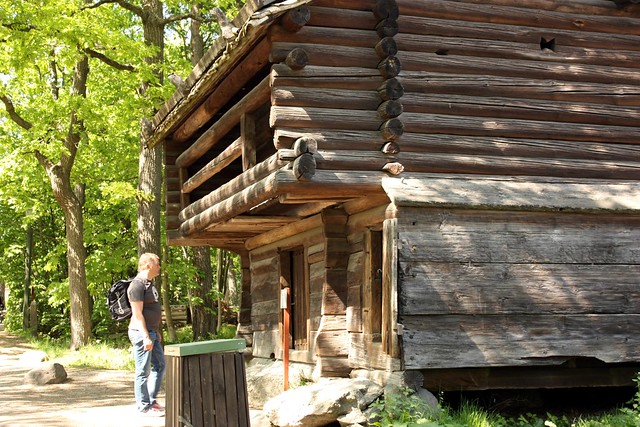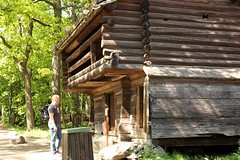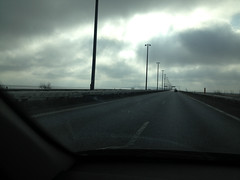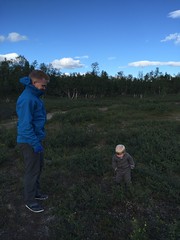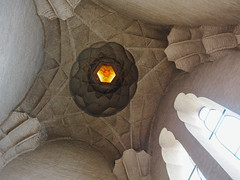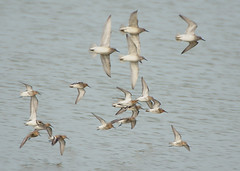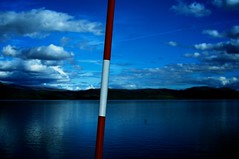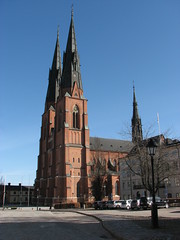 Sweden
Sweden
Sweden, formally the Kingdom of Sweden, is a Nordic country located on the Scandinavian Peninsula in Northern Europe. It borders Norway to the west and north, Finland to the east, and is connected to Denmark in the southwest by a bridgeunnel across the Öresund. At , Sweden is the largest Nordic country, the third-largest country in the European Union, and the fifth-largest country in Europe. The capital and largest city is Stockholm.Sweden has a total population of 10.5 million, and a low population density of , with around 87% of Swedes residing in urban areas, which cover 1.5% of the entire land area, in the central and southern half of the country.
Nature in Sweden is dominated by forests and many lakes, including some of the largest in Europe. Many long rivers run from the Scandes range through the landscape, primarily emptying into the northern tributaries of the Baltic Sea. It has an extensive coastline and most of the population lives near a major body of water. With the country ranging from 55°N to 69°N, the climate of Sweden is diverse due to the length of the country. The usual conditions are mild for the latitudes with a maritime south, continental centre and subarctic north. Snow cover is variable in the densely populated south, but reliable in higher latitudes. Furthermore, the rain shadow of the Scandes results in quite dry winters and sunny summers in much of the country.
Germanic peoples have inhabited Sweden since prehistoric times, emerging into history as the Geats (Swedish: Götar) and Swedes and constituting the sea peoples known as the Norsemen. An independent Swedish state emerged during the early 12th century. After the Black Death in the middle of the 14th century killed about a third of the Scandinavian population, the dominance of the Hanseatic League in Northern Europe threatened Scandinavia economically and politically. This led to the forming of the Scandinavian Kalmar Union in 1397, which Sweden left in 1523. When Sweden became involved in the Thirty Years' War on the Protestant side, an expansion of its territories began, forming the Swedish Empire, which remained one of the great powers of Europe until the early 18th century.
Swedish territories outside the Scandinavian Peninsula were gradually lost during the 18th and 19th centuries, ending with the annexation of present-day Finland by Russia in 1809. The last war in which Sweden was directly involved was in 1814 when Norway was militarily forced into a personal union, which peacefully dissolved in 1905. In 2014, Sweden celebrated 200 years of peace, a longer span of peacetime than even Switzerland. Sweden maintained an official policy of neutrality during wartime and non-participation in military alliances during peacetime, although Sweden secretly relied on U.S. nuclear submarines during the Cold War. Sweden has since 2008 joined EU battlegroups, provided intelligence to NATO and since 2009 openly moved towards cooperation with NATO.
Sweden is a highly developed country ranked seventh in the Human Development Index, it is a constitutional monarchy and a parliamentary democracy, with legislative power vested in the 349-member unicameral . It is a unitary state, currently divided into 21 counties and 290 municipalities. Sweden maintains a Nordic social welfare system that provides universal health care and tertiary education for its citizens. It has the world's 12th highest GDP per capita and ranks very highly in quality of life, health, education, protection of civil liberties, economic competitiveness, income equality, gender equality and prosperity. Sweden joined the European Union on 1 January 1995 but rejected Eurozone membership following a referendum. It is also a member of the United Nations, the Nordic Council, the Council of Europe, the World Trade Organization and the Organisation for Economic Co-operation and Development (OECD).
Etymology
The name for Sweden is generally agreed to derive from the Proto-Indo-European root *, meaning "one's own", referring to one's own tribe from the tribal period. The native Swedish name, (a compound of the words and , with lenition of the consonant k, first recorded in the cognate in Beowulf), translates as "realm of the Swedes", which excluded the Geats in Götaland.
The contemporary English variation was derived in the 17th-century from Middle Dutch and Middle Low German. As early as 1287, references are found in Middle Dutch referring to a ("land of the Swedes"), with as the singular form. In Old English the country was known as or , and in Early Modern English as . Some Finnic languages, such as Finnish and Estonian, use the terms and ; these variations refer to the Rus' people who inhabited the coastal areas of Roslagen in Uppland and who gave their name to Russia.
History
Prehistory
Sweden's prehistory begins in the Allerød oscillation, a warm period around 12,000 BC, with Late Palaeolithic reindeer-hunting camps of the Bromme culture at the edge of the ice in what is now the country's southernmost province, Scania. This period was characterised by small clans of hunter-gatherers who relied on flint technology.
Sweden and its people were first described by Publius Cornelius Tacitus in his written work Germania (98 AD). In he mentions the Swedes (Suiones) as a powerful tribe (distinguished not merely for their arms and men, but for their powerful fleets) with ships that had a prow at each end (longships). Which kings ruled these Suiones is unknown, but Norse mythology presents a long line of legendary and semi-legendary kings going back to the last centuries BC. As for literacy in Sweden itself, the runic script was in use among the south Scandinavian elite by at least the second century AD, but all that has come down to the present from the Roman Period is curt inscriptions on artefacts, mainly of male names, demonstrating that the people of south Scandinavia spoke Proto-Norse at the time, a language ancestral to Swedish and other North Germanic languages.
In the sixth century, Jordanes names two tribes living in Scandza, both of which are now considered to be synonymous with the Swedes: the and . Suetidi is considered to be the Latin form of , the Old Norse name for the Swedes. Jordanes describes the and Dani as being of the same stock and the tallest of people. He later mentions other Scandinavian tribes as being of a same stature. The were known to the Roman world as suppliers of black fox skins and, according to Jordanes, had very fine horses, similar to those of the Thyringi of .
Vikings
The Swedish Viking Age lasted roughly from the eighth century to the 11th century. It is believed that Swedish Vikings and Gutar mainly travelled east and south, going to Finland, Estonia, the Baltic countries, Russia, Belarus, Ukraine, the Black Sea and even as far as Baghdad. Their routes passed through the Dnieper south to Constantinople, on which they carried out numerous raids. The Byzantine Emperor Theophilos noticed their great skills in war, and invited them to serve as his personal bodyguard, known as the Varangian Guard. The Swedish Vikings, called Rus are believed to be the founding fathers of Kievan Rus'. The Arab traveller Ibn Fadlan described these Vikings saying:
The actions of these Swedish Vikings are commemorated on many runestones in Sweden, such as the Greece runestones and the Varangian runestones. There was also considerable participation in expeditions westwards, which are commemorated on stones such as the England runestones. The last major Swedish Viking expedition appears to have been the ill-fated expedition of Ingvar the Far-Travelled to Serkland, the region south-east of the Caspian Sea. Its members are commemorated on the Ingvar runestones, none of which mentions any survivor. What happened to the crew is unknown, but it is believed that they died of sickness.
Kingdom of Sweden
It is not known when and how the kingdom of Sweden was born, but the list of Swedish monarchs is drawn from the first kings known to have ruled both Svealand (Sweden) and Götaland (Gothia) as one province, beginning with Eric the Victorious. Sweden and Gothia were two separate nations long before that and since antiquity. It is not known how long they existed: the epic poem Beowulf describes semi-legendary Swedish-Geatish wars in the sixth century. Götaland in this sense mainly includes the provinces of Östergötland (East Gothia) and Västergötland (West Gothia). The island of Gotland was disputed by other than Swedes, at this time (Danish, Hanseatic, and Gotland-domestic). Småland was at that time of little interest to anyone due to the deep pine forests, and only the city of Kalmar with its castle was of importance. The south-west parts of the Scandinavian peninsula consisted of three Danish provinces (Scania, Blekinge and Halland). North of Halland, Denmark had a direct border to Norway and its province Bohuslän. But there were Swedish settlements along the southern coastline of Norrland.
During the early stages of the Scandinavian Viking Age, Ystad in the Danish province Scania and Paviken on Gotland were flourishing centres of trade, but they were not parts of the early Swedish Kingdom. Remains of what is believed to have been a large market dating from 600 to 700 CE have been found in Ystad. In Paviken, an important centre of trade in the Baltic region during the ninth and tenth century, remains have been found of a large Viking Age harbour with shipbuilding yards and handicraft industries. Between 800 and 1000, trade brought an abundance of silver to Gotland, and according to some scholars, the Gotlanders of this era hoarded more silver than the rest of the population of Scandinavia combined.
Saint Ansgar is usually credited with introducing Christianity to Sweden in 829, but the new religion did not begin to fully replace paganism until the 12th century. During the 11th century, Christianity became the prevalent religion, and from 1050 Sweden is counted as a Christian nati…
Looking for places related to Sweden?
Those are other destinations to find places related to Sweden:
